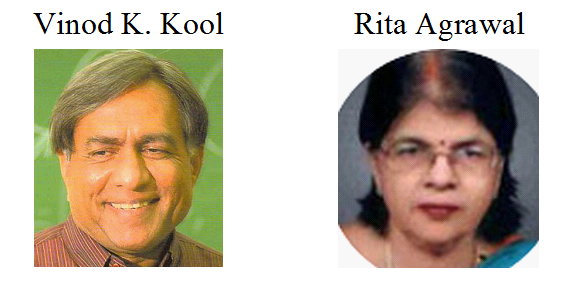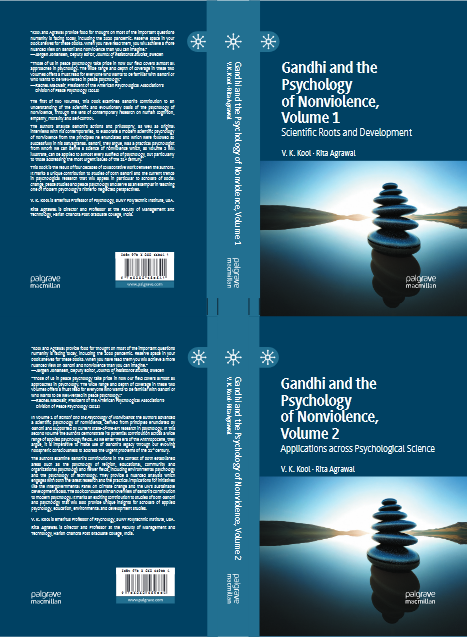| |

V. K. Kool (b. 1942) is Emeritus Professor of Psychology, SUNY Polytechnic Institute, USA. Author of seven books, including The Psychology of Nonviolence and Aggression (2008) and recipient of three Fulbright awards, Kool was member of the Editorial Board of APA’s Peace Division journal, Peace and Conflict, for seven years. https://www.springer.com/us/book/9783030568641#aboutAuthors | Rita Agrawal (b. 1949) is Director and Professor at the Faculty of Management and Technology, Harish Chandra Post Graduate College, India (http://www.hcpgcollege.edu.in/hcpghome). She is the author of five books, including Stress in Life and at Work (2001), and Psychology of Technology (2016 with Kool), and has been the recipient of both national and international awards. http://www.hcpgcollege.edu.in |

Macmillan Palgrave, USA/UK, 2020 ISBN 978-3-030-56864-1 “Kool and Agrawal provide food for thought on most of the important questions humanity is facing today, including the 2020 pandemic. Reserve space in your book shelves for these books. When you have read them, you will achieve a more nuanced view on Gandhi and nonviolence than you can imagine.”—Jørgen Johansen, Deputy Editor, Journal of Resistance Studies, Sweden“ “Those of us in peace psychology take pride in how our field covers almost all approaches in psychology. The wide range and depth of coverage in these two volumes offers a must read for everyone who wants to be familiar with Gandhi or who wants to be well-versed in peace psychology.”— Rachel MacNair, President of the American Psychological Association’s Division of Peace Psychology (2013) The first of two volumes, this book examines Gandhi’s contribution to an understanding of the scientific and evolutionary basis of the psychology of nonviolence, through the lens of contemporary research on human cognition, empathy, morality and self-control. The authors analyze Gandhi’s actions and philosophy, as well as original interviews with his contemporaries, to elaborate a modern scientific psychology of nonviolence from the principles he enunciated and which were followed so successfully in his Satyagrahas. Gandhi, they argue, was a practical psychologist from whom we can derive a science of nonviolence which, as Volume 2 will illustrate, can be applied to almost every subfield of psychology, but particularly to those addressing the most urgent issues of the 21st century. This book is the result of four decades of collaborative work between the authors. It marks a unique contribution to studies of both Gandhi and the current trends in psychological research that will appeal in particular to scholars of social change, peace studies and peace psychology and serve as an exemplar in teaching one of modern psychology’s hitherto neglected perspectives. V. K. Koolis Emeritus Professor of Psychology, SUNY Polytechnic Institute, USA. Rita Agrawalis Director and Professor at the Faculty of Management and Technology, Harish Chandra Post Graduate College, India. V. K. Kool · Rita Agrawal. Gandhi and the Psychology of Nonviolence, Volume 1, 2020, Scientific Roots and Development ISBN 978-3-030-56988-4 “Kool and Agrawal provide food for thought on most of the important questions humanity is facing today, including the 2020 pandemic. Reserve space in your book shelves for these books. When you have read them you will achieve a more nuanced view on Gandhi and nonviolence than you can imagine.”—Jørgen Johansen, Deputy Editor, Journal of Resistance Studies, Sweden “Those of us in peace psychology take pride in how our fi eld covers almost all approaches in psychology. The wide range and depth of coverage in these two volumes offers a must read for everyone who wants to be familiar with Gandhi or who wants to be well-versed in peace psychology.”— Rachel MacNair, President of the American Psychological Association‘s Division of Peace Psychology (2013) In Volume 1 of Gandhi and the Psychology of Nonviolence, the authors advanced a scientific psychology of nonviolence, derived from principles enunciated by Gandhi and supported by current state-of-the-art research in psychology. In this second volume the authors demonstrate its potential contribution across a wide range of applied psychology fields. As we enter the era of the Anthropocene, they argue, it is imperative to make use of Gandhi’s legacy through our evolving noospheric consciousness to address the urgent problems of the 21st century. The authors examine Gandhi’s contributions in the context of both established areas such as the psychology of religion, educational, community and organizational psychology and newer fields, including environmental psychology and the psychology of technology. They provide a nuanced analysis, which engages with both the latest research and the practical implications for initiatives like the Intergovernmental Panel on Climate Change and the UN’s Sustainable Development Goals. The book concludes with an overview of Gandhi’s contribution to modern psychology. It marks an exciting contribution to studies of both Gandhi and psychology that will also provide unique insights for scholars of applied psychology, education, environmental and development studies. V. K. Kool · Rita Agrawal. Gandhi and the Psychology of Nonviolence, Volume 2, 2020, Applications across Psychological Science ------------------------------------------ In process
Up
|